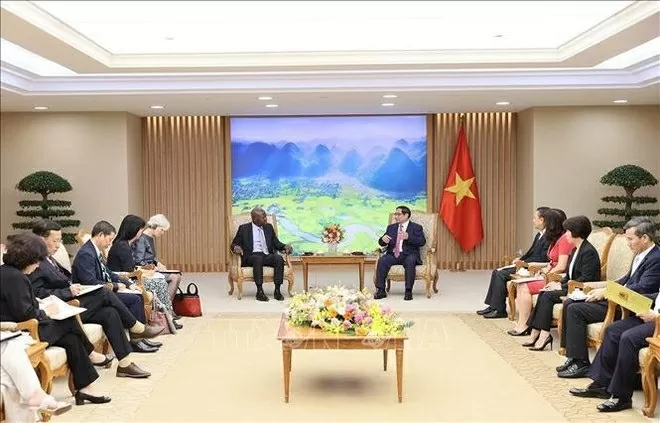
Labour commitments in new-generation FTAs: Reform pressure can be a breakthrough opportunity
Latest
 |
| Labour commitments in new-generation FTAs: Reform pressure can be a breakthrough opportunity. (Photo: WVR) |
Guy Ryder, Director-General of the International Labour Organization (ILO) from 2012 to 2022, pointed out that the global economy is undergoing profound transformations —ranging from digitalization and climate change to worldwide crises. In this context, strengthening the workforce is not only a moral imperative but also a decisive factor in the success of nations and businesses alike.
Guy Ryder emphasized that to maintain competitiveness and sustainable growth, countries and enterprises must focus on generating quality employment, upskilling the workforce, and ensuring the protection of workers’ rights.". These steps help reduce social inequality while promoting sustainable economic growth.
Labour Commitments – “Institutional Lever”
In an era of deep global integration, the former ILO Director-General's remarks carry special weight: compliance with international labour standards not only helps maintain trade relations but also enhances national brand value. Valuing the workforce means investing in education and vocational training, higher productivity, and a better quality of life — key factor for sustainable development and successful global integration.
Amid deepening global integration, new-generation free trade agreements (FTAs) are no longer mere economic agreements —they demand comprehensive institutional reforms, with labour factor emerging as one of the most critical yet sensitive commitments.
Unlike traditional FTAs, the Comprehensive and Progressive Agreement for Trans-Pacific Partnership (CPTPP) and the EU-Vietnam Free Trade Agreement (EVFTA) include clear, binding provisions on labour. Both agreements require member countries to comply with ILO core labour standards, including freedom of association, collective bargaining, elimination of forced labour and child labour and non-discrimination in employment.
Notably, EVFTA even encourages the ratification and enforcement of yet-unratified ILO conventions, pushing for a comprehensive roadmap for legal and policy reform. Meanwhile, the pressure to implement CPTPP is even deeper with stringent enforcement mechanisms including inter-state dispute resolution if violations are detected.
Analysts say that as a developing country, Vietnam's willingness to accept the challenge of implementing labour commitments in new-generation FTAs such as CPTPP and EVFTA represents not only a legal challenge, but also a test of its institutional reform capacity and an opportunity to raise sustainability standards, and a step toward strengthening its international standing.
In practice, Vietnam has made significant strides in labour reform and seriously implemented international labour standards. According to a 2024 study by the Hanoi Law University, Vietnam has ratified 25 ILO conventions, including 9 out of 10 fundamental conventions, 3 out of 4 governance conventions, and 13 technical conventions. The ratification of Convention 98 on the right to organize and collective bargaining and Convention 105 on the abolition of forced labour demonstrates Vietnam’s strong political will and efforts to incorporate international labour standards into national law.
The revised 2019 Labour Code is considered a historic milestone. It incorporates many international commitments, recognizing workers' rights to form organizations independent of the traditional trade union system. This opens the door to independent unions and genuine collective bargaining, thereby fostering positive pressure on productivity and work environments.
During his meeting with Prime Minister Pham Minh Chinh on June 30, 2023, as part of his official visit to Vietnam, ILO Director-General Gilbert F. Houngbo praised Vietnam as a model of development and reform for others countries to refer to and learn from.
 |
| Labour commitments in new-generation FTAs: Prime Minister Pham Minh Chinh receives Director-General of the International Labour Organisation (ILO) Gilbert F. Houngbo in Hanoi, on June 30, 2023. (Photo: VNA) |
Providing further context on Vietnam’s development approach, Prime Minister Pham Minh Chinh said that the country is being built on three foundational pillars: a socialist rule-of-law state, socialist democracy, and a socialist-oriented market economy.
Simultaneously, Vietnam is promoting an independent, self-reliant economy actively engaged in broad, effective, and substantial international integration.
Throughout this process, people are placed at the center—as the goal, driver, and resource for development. Vietnam commits not to trade off social progress, justice, and environmental protection for mere economic growth. The country is also reforming toward a balanced approach between economic and social development; enhancing labour productivity; expanding and strengthening its social security system; modernizing labour market institutions and labor law; and ensuring the legal rights and interests of workers.
Making efforts to bridge the remaining gaps
Despite the progress and incorporation of core principles into Vietnam’s Labour Code, challenges remain in implementing labour commitments.
Vietnam is currently preparing to ratify ILO Convention 87, which guarantees workers the right to freely form and join trade unions without government interference. However, the current legal framework—especially the 2019 Labour Code—still imposes certain constraints, such as registration and operational controls the activities of trade unions, which do not fully align with Convention 87’s standards.
Ratifying Convention 87 is a crucial step in fulfilling commitments under new-generation FTAs. This process requires careful preparation and a suitable roadmap to ensure compatibility with national laws and social realities. Therefore, ratifying Convention No. 87 is not only an international obligation but also a crucial step in advancing workers' rights and improving Vietnam’s investment climate.
Another significant challenge lies in the lack of awareness among businesses and workers—especially in the private sector—about labour rights. A recent survey by the Vietnam Chamber of Commerce and Industry (VCCI) found that over 60% of businesses were unaware of new regulations on worker representative organizations and obligations arising from EVFTA or CPTPP. The percentage of enterprises thoroughly understanding new-generation FTAs remains limited.
Meanwhile, developed markets—especially the EU—have begun enforcing stricter post-ratification monitoring mechanisms. Under EVFTA, the European Commission may initiate consultations or even activate arbitration procedures in response to labour violations. As EU trade policy shifting toward “sustainable trade,” Vietnamese exports may face technical barriers if labor standards are not rigorously followed.
Notably, in the 2023-2024 period, a number of major EU importers in textiles and footwear industries began requiring labour ethics compliance in the supply chains, including proof of no forced labour and functioning collective bargaining systems within companies. These are no longer mere “recommendations,” but increasingly mandatory trade conditions.
For an export-oriented economy like Vietnam, ensuring worker rights and welfare is not only a social responsibility but a prerequisite for entering responsible global supply chains.
“In the new global economy, those who disregard their workforce will eliminate themselves from the game,” said former ILO Director-General Guy Ryder. His message stands as a wake-up call to all countries and businesses alike – to value their workforce as a core element in their development strategy.
Vietnam, too, as an emerging economy striving to assert its position in an increasingly volatile world, developing a strong human capital base and aligning with international labour standards is an opportunity to reaffirm its global commitment and build a sustainable, equitable, and prosperous economy.

















